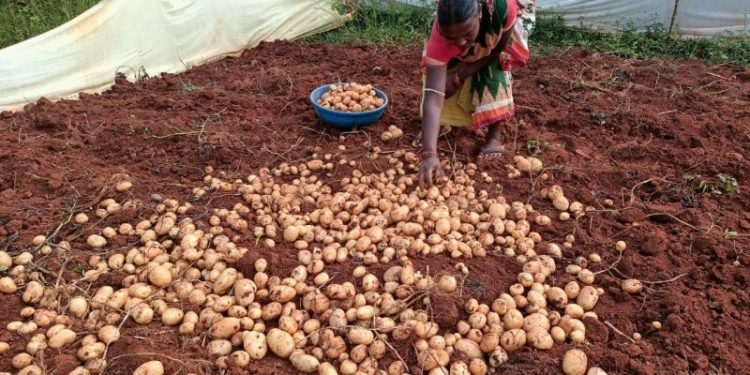As the potato planting season draws near, small-scale farmers in Asia find themselves at a crossroads, contemplating a crucial decision that could significantly impact their livelihoods and the food security of millions of people. The question they face is whether to invest in quality seeds or not. According to Samarendu Mohanty, the Asia Regional Director at the International Potato Center (CIP), this decision carries immense significance in ensuring a successful potato harvest and safeguarding the well-being of impoverished consumers in the subcontinent.
Seed selection is a fundamental aspect of agriculture that can make or break a farming season. In the case of potatoes, the choice of seeds plays a pivotal role in determining yield, quality, and resistance to pests and diseases. However, small farmers often grapple with the financial constraints that come with acquiring quality seeds. Indian seed suppliers have projected seed costs for the upcoming season to range from INR Rs. 75,000-100,000 per hectare, a substantial investment for resource-limited farmers.
The cost of potato seeds varies based on several factors, including the variety, generation, and size. Different potato varieties are tailored to specific growing conditions and consumer preferences. Investing in the right variety can lead to higher yields and better market value for the produce. Moreover, the generation of the seed also matters, as newer generations tend to offer improved traits such as disease resistance and uniformity. Larger-sized seeds often result in more robust and healthy plants.
One of the critical challenges small farmers face is the temptation to opt for cheaper, lower-quality seeds in an attempt to reduce upfront costs. However, this decision can have dire consequences. Low-quality seeds may lead to poor germination rates, increased susceptibility to diseases, and lower yields. Ultimately, the cost savings from choosing cheaper seeds can be outweighed by the reduced harvest and income losses.
The significance of a bumper potato harvest cannot be overstated, especially in regions where potatoes are a staple food crop. Potatoes serve as a vital source of nutrition and sustenance for millions of people across Asia, particularly those in lower-income brackets. A successful potato season helps stabilize food prices and ensures a steady supply of affordable and nutritious food. Conversely, a poor potato harvest can lead to price spikes, exacerbating food insecurity and increasing the financial burden on already vulnerable populations.
To address the challenges faced by small farmers, governments, non-governmental organizations, and agricultural institutions like the International Potato Center (CIP) play a crucial role. These stakeholders can provide support in various forms, including access to subsidized quality seeds, training on modern farming techniques, and assistance with pest and disease management. By investing in quality seeds and providing the necessary resources and knowledge, small farmers can increase their chances of a successful potato season, thereby contributing to food security and economic stability in the region.
In conclusion, the decision to invest in quality potato seeds is a pivotal choice that small farmers in Asia must make as the planting season approaches. While the upfront costs may be daunting, the long-term benefits in terms of higher yields, better quality produce, and improved food security for millions make it a decision of paramount importance. Collaboration between governments, agricultural organizations, and the private sector is essential in ensuring that small farmers have access to the resources and support they need to make the right choice and secure a prosperous potato harvest.







